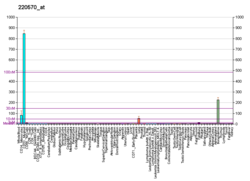
Back ريزيستين Arabic Rezistin BS RETN Welsh Resistin German Ρεζιστίνη Greek Resistina Spanish رزیستین Persian Résistine French Resistina Galician Resistin ID
Resistin also known as adipose tissue-specific secretory factor (ADSF) or C/EBP-epsilon-regulated myeloid-specific secreted cysteine-rich protein (XCP1) is a cysteine-rich peptide hormone derived from adipose tissue that in humans is encoded by the RETN gene.[5]
In primates, pigs, and dogs, resistin is secreted by immune and epithelial cells, while, in rodents, it is secreted by adipose tissue. The length of the resistin pre-peptide in human is 108 amino acid residues and in the mouse and rat it is 114 aa; the molecular weight is ~12.5 kDa. Resistin is an adipose-derived hormone (similar to a cytokine) whose physiologic role has been the subject of much controversy regarding its involvement with obesity and type II diabetes mellitus (T2DM).[6]
- ^ a b c GRCh38: Ensembl release 89: ENSG00000104918 – Ensembl, May 2017
- ^ a b c GRCm38: Ensembl release 89: ENSMUSG00000012705 – Ensembl, May 2017
- ^ "Human PubMed Reference:". National Center for Biotechnology Information, U.S. National Library of Medicine.
- ^ "Mouse PubMed Reference:". National Center for Biotechnology Information, U.S. National Library of Medicine.
- ^ Wang H, Chu WS, Hemphill C, Elbein SC (June 2002). "Human resistin gene: molecular scanning and evaluation of association with insulin sensitivity and type 2 diabetes in Caucasians". J. Clin. Endocrinol. Metab. 87 (6): 2520–4. doi:10.1210/jcem.87.6.8528. PMID 12050208.
- ^ Lazar MA (October 2007). "Resistin- and Obesity-associated metabolic diseases". Horm. Metab. Res. 39 (10): 710–6. doi:10.1055/s-2007-985897. PMID 17952831.
© MMXXIII Rich X Search. We shall prevail. All rights reserved. Rich X Search





